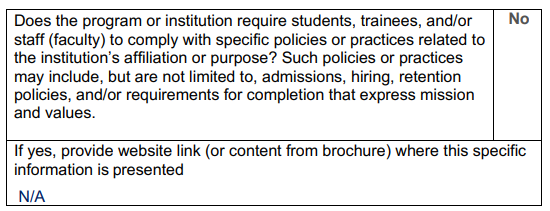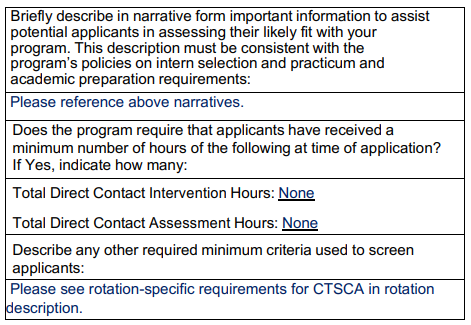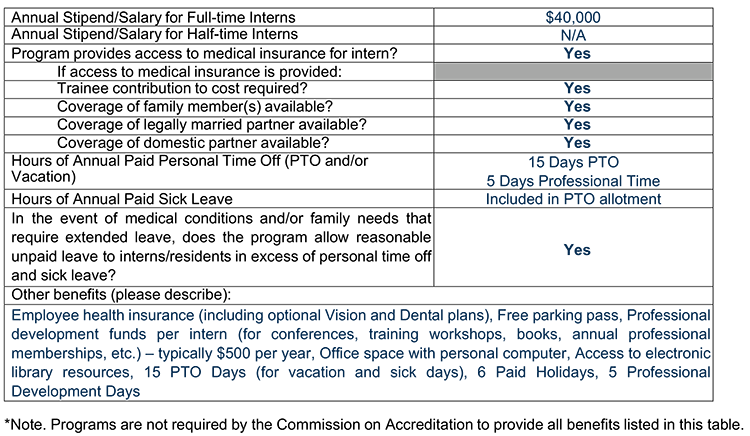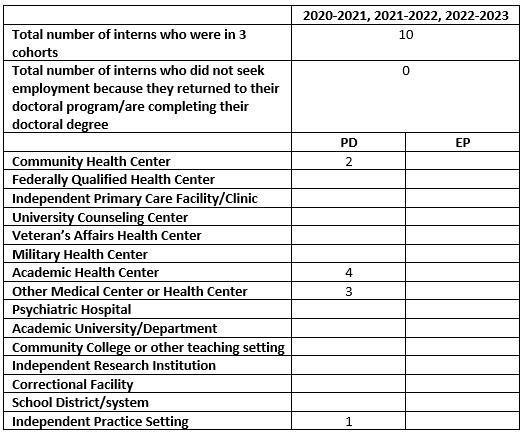Internship Admissions, Support, and Initial Placement Data
Date Program Tables Are Updated: July of each year
Program Disclosures

Internship Program Admissions:
Our internship program welcomes and celebrates applicants from all personal, familial and cultural backgrounds. Past internship classes have included individuals from a wide-variety of backgrounds, including rural and urban areas, individuals fluent in a number of languages, and past interns have hailed from across the globe, representing diverse religious beliefs, and have identified as LGBTQIA+ and other gender or sexual identities. The Allegheny Health Network is fully committed to opposing discrimination in recruitment, selection, placement, transfer, promotion, reassignment, compensation, benefits, disciplinary actions, separation from employment and other terms and conditions of employment.
In the cover letter, applicants must indicate their two preferred major rotations and rationale for choices based on experience and career aspirations. Applications are reviewed by the Director of Training or Associate Director of Training and two faculty members in order to evaluate the degree of match between the applicant’s prior training experiences, career aspirations, and the training opportunities available through the AGH Psychology Internship. Applicants with appropriate fit are then invited to interview in via Zoom virtual meetings in December. Candidates who attend the Zoom interviews are involved in small group introductions to the rotations. Applicants participate in several individual faculty interviews during the second half of the interview experience. The interviews are offered on two Fridays in December and last between 8:00 AM – 3:30 PM. Interview procedures, including our photography policy, are thoroughly explained to all applicants.
Faculty complete standardized rating forms for both the initial APPIC applications and the interviews. At the end of the recruitment process, a faculty ranking meeting is held. Interns are invited to provide feedback before the meeting, but do not attend the full ranking meeting. At the ranking meeting, the preliminary rankings are reviewed and modified before submitting them to the match process. On the match date and following notification of the match results to the Director of Training, contact is made with each successfully matched candidate to welcome them to the internship.
Does the program require that applicants have received a minimum number of hours of the following at time of application?
- Total Direct Contact Intervention Hours: NO
- Total Direct Contact Assessment Hours: NO
Other required minimum criteria used to screen applicants:
There are no specific academic requirements for application to the AGH Psychology Internship. However, applicants from APA-approved training program are preferred. As such the applicants are expected to have completed academic training in the areas of personality theory, biological, cognitive, social, and affective aspects of behavior, theories and methods of psychological assessment diagnosis, effective psychological intervention, theories of psychopathology and behavioral dysfunction, research design and methods, and professional ethics.
There are also no minimal requirements for the amount of practicum hours general applicants must have prior to applying to the AGH Psychology Internships; however applicants are expected to have completed practicum experiences in both psychological assessment and intervention. All of these educational activities should have been completed in the context of sensitivity to cultural and individual diversity as well as current professional standards. Interns interested in child training through the Center for Traumatic Stress for Children & Adolescents (CTSCA) must prequalify for the rotation by having previously completed a course in developmental psychopathology, completed practicum training with child & adolescent cases, and completed the online, TF-CBT training (medicine.musc.edu) prior to beginning the CTSCA major rotation.
We rely on the letter of readiness completed and signed by the Graduate Director of Clinical Training at the applicant’s home institution which is submitted through the standard APPIC application. Applicants with didactic training and clinical practica in the training areas offered by AGH are preferred.
Financial and Other Benefit Support for Upcoming Training Year*
Annual Stipend/Salary for Full-time Interns: $40,000
Annual Stipend/Salary for Half-time Interns: N/A
Program provides access to medical insurance for intern: YES
Trainee contribution to cost required: YES
Coverage of family member(s) available: YES
Coverage of legally married partner available:YES
Coverage of domestic partner available: YES
Hours of annual paid personal time off (PTO for vacation and sick time): 120
Hours of annual paid sick leave: Included in PTO above
In the event of medical conditions and/or family needs that require extended leave, does the program allow reasonable unpaid leave to interns/residents in excess of personal time off and sick leave: YES
Other benefits:
- Employee health insurance (including optional Vision and Dental plans)
- Free parking pass
- Professional development funds per intern (for conferences, training workshops, books, annual professional memberships, etc.) – typically $500 per year
- Office space with personal computer, standing desk, mobile phone, and technology to support virtual office
- Access to electronic library resources
- 15 PTO Days (for vacation and sick days)
- 6 Paid Holidays
- 5 Professional Development Days
*Note: Programs are not required by the Commission on Accreditation to provide all benefits listed.
Trainee Admissions, Support, and Outcome Data
Internship Program Admissions

Financial and other Benefit Support for Upcoming Training Year


Initial Post-Residency Positions
(Aggregated Tally for the Preceding 3 cohorts) 2022-2025
Note. “PD” = Post-doctoral residency position; “EP” = Employed Position. Each individual represented in this table should be counted only one time. For former trainees working in more than one setting, select the setting that represents their primary position.

